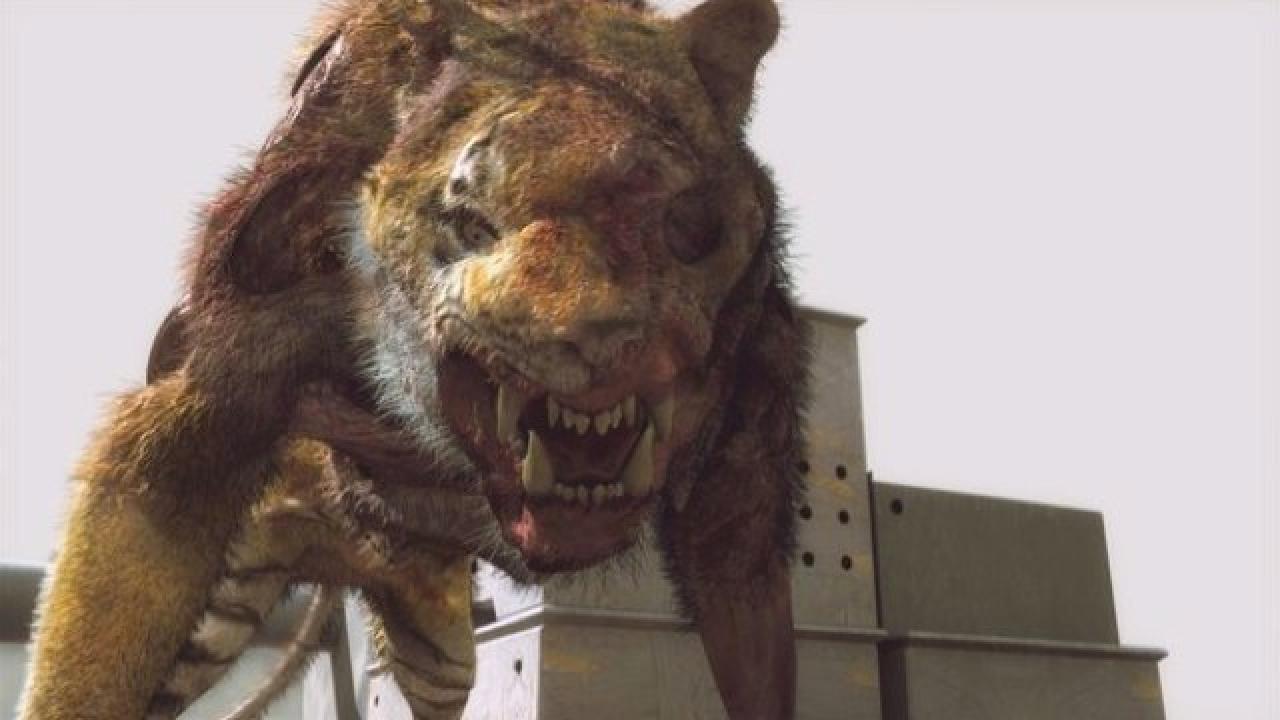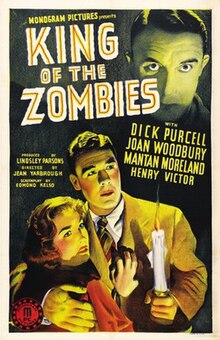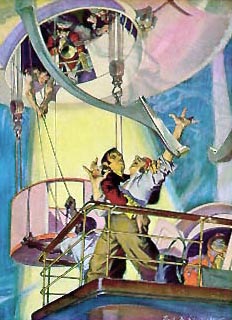Things To Come - Here's a film right up the Mutant Future crowd's alley. Recently a post over at The Savage Afterworld
got me thinking about this film.Sniderman's post about the Last American got me thinking about Things To Come. The film's screen play is by HG Well's & its pretty dark stuff. The movie has been panned in some circles & raised to highest esteem in others. The plot is a skip through history, now alternative history about the future.
Successful businessman John Cabal (
Raymond Massey) cannot enjoy Christmas Day, 1940, with the ominous news of possible war. His guest Harding (Maurice Braddell) shares his worries, but over-optimistic friend Passworthy (
Edward Chapman) believes it will not come to pass, or even if it does, it will do good by accelerating technological progress. A bombing raid on the city that night results in general mobilization and global war.
Some time later, Cabal, now piloting a
biplane, shoots down a one-man enemy bomber. He lands and pulls the badly injured enemy (
John Clements) from the wreckage. As they dwell on the madness of war, they have to put on their
gas masks, as
poison gas drifts in their direction. When a little girl runs towards them, the wounded man insists she take his mask, saying he is done for anyway. Cabal takes the girl to his aeroplane, pausing to leave the doomed man a revolver. The man dwells on the irony that he may have gassed the child's family and yet he has saved her. He then shoots himself.
The war continues for decades, long enough for the survivors to have forgotten why they are fighting in the first place. Humanity enters a new
Dark Age. The world is in ruins and there is little technology left apart from the firearms used to wage war. In 1966, a plague called the "wandering sickness" is spread by the unnamed enemy using its last few remaining aircraft. Dr. Harding and his daughter Mary struggle to find a cure, but with little equipment, it is hopeless.
By 1970, a local warlord called the "Chief" or the "Boss" (
Ralph Richardson) has risen to power in the south of England and eradicated the sickness by shooting the infected. He dreams of conquering the "hill people" to obtain coal and shale to render into oil so his biplanes can fly again.
On May Day 1970, a futuristic aeroplane lands outside the town. The sole pilot, John Cabal, emerges and proclaims that the last surviving band of "engineers and mechanics" have formed a civilization called "Wings Over the World". They are based in
Basra,
Iraq, and have renounced war and outlawed independent nations. The Boss takes the pilot prisoner and forces him to work for Gordon, a mechanic working on repairing the few remaining aeroplanes. Together, they manage to fix a plane. When Gordon takes it up for a test flight, he flees to alert Cabal's friends.
Wings Over the World attacks Everytown with gigantic aeroplanes and drops sleeping gas bombs on the town. The Boss orders his biplanes to attack but they are shot down. The people of Everytown awaken shortly thereafter, to find it occupied by the Airmen and the Boss dead.
A
montage follows, showing decades of technological progress, beginning with Cabal explaining plans for global consolidation by Wings Over the World. By 2036, mankind lives in modern underground cities, including the new Everytown.
However, all is not well. The sculptor Theotocopulos (
Cedric Hardwicke) incites the populace to demand a "rest" from the rush of progress, symbolized by the first manned flight around the
Moon. The modern-day
Luddites are opposed by Oswald Cabal (Massey again), the head of the governing council and great grandson of John Cabal. Cabal's daughter Catherine (Pearl Argyle) and her boyfriend Horrie Passworthy insist on flying the spaceship. When a mob rushes to destroy the
space gun used to propel the spacecraft, Cabal launches the ship ahead of schedule.
Cabal then delivers a speech about
Progress and humanity's quest for knowledge, asking, "And if we’re no more than animals, we must snatch each little scrap of happiness, and live, and suffer, and pass, mattering no more than all the other animals do or have done. It is this, or that. All the universe or nothing. Which shall it be, Passworthy? Which shall it be?"
The Things To Come as social commentary is well odd & as a lens through viewing history its just as odd.
Here why according to Wiki:
The film, written throughout 1934, is notable for predicting
World War II, being only 16 months off by having it start on Christmas 1940, rather than 1 September 1939. Its graphic depiction of
strategic bombing in the scenes in which Everytown is flattened by air attack and society collapses into barbarism, echo pre-war concerns about the threat of the
bomber and the apocalyptic pronouncements of air power prophets. Wells was an air power prophet of sorts, having described aerial warfare in
Anticipations (1901) and
The War in the Air (1908).
The use of
gas bombs is very much part of the film, from the
poison gas used early in the war to the sleeping gas used by the airmen of Wings Over the World. In real life, in the build-up to the
Second World War, there was much concern that the Germans would use poison gas, which was used by France, Germany and Great Britain during the
Great War. Civilians were required to carry
gas masks and were trained in their use. When war did break out, however, the Germans did not use gas for military purposes.
Wings Over the World is based in
Basra, in southern
Iraq, from where it begins a new civilisation. Southern Iraq was also the home of one of the world's first known civilisations,
Sumer, which began about 6,000 B.C. and invented
the wheel, among a host of other things.
The single world government having engineers, scientists and inventors as the rulers mimics the ideology of the concept of
Technocracy where those of the greatest skill and intellect in various vocations would be the leaders.
The Kipling connection
Wells's "Air and Sea Control", the association of pilots and technicians which controls the world's communications and eventually develops into a world government, seems a clear literary descendant of an institution called the
Aerial Board of Control (A.B.C.) in the short stories "
With the Night Mail" and "
Easy as A.B.C.", by
Rudyard Kipling, with which Wells was certainly familiar. The Kipling stories are set in a post-apocalyptic world where
airships are commonly used both for freight and passenger service, as well as for preventing civil unrest through use of powerful sonic weapons:
| “ | The A.B.C., that semi-elected, semi-nominated body of a few score persons, controls the Planet. Transportation is Civilisation, our motto runs. Theoretically we do what we please, so long as we do not interfere with the traffic and all it implies. Practically, the A.B.C. confirms or annuls all international arrangements, and, to judge from its last report, finds our tolerant, humorous, lazy little Planet only too ready to shift the whole burden of public administration on its shoulders. | ” |
The above description, from Kipling's "
With the Night Mail", seems very applicable to the worldwide institution depicted by Wells. However, Kipling's stories contain
dystopian elements.
Wells's book might have also been influenced by
George Griffith's
1893 The Angel of the Revolution in which a band of revolutionaries known as 'The Brotherhood of Freedom' masters the technology of flight and eventually establishes a
pax aeronautica over the earth.











